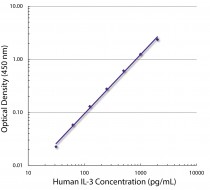ARG21432
anti-IL3 antibody [BVD8-3G11]
anti-IL3 antibody [BVD8-3G11] for ELISA,Immunoprecipitation,Neutralizing,Western blot and Human
Overview
| Product Description | Rat Monoclonal antibody [BVD8-3G11 ] recognizes IL3 |
|---|---|
| Tested Reactivity | Hu |
| Tested Application | ELISA, IP, Neut, WB |
| Specificity | Human IL-3. |
| Host | Rat |
| Clonality | Monoclonal |
| Clone | BVD8-3G11 |
| Isotype | IgG1, kappa |
| Target Name | IL3 |
| Antigen Species | Human |
| Immunogen | Yeast-expressed human IL-3 |
| Conjugation | Un-conjugated |
| Alternate Names | MCGF; Mast cell growth factor; P-cell-stimulating factor; Hematopoietic growth factor; IL-3; Interleukin-3; Multipotential colony-stimulating factor; MULTI-CSF |
Application Instructions
| Application Suggestion |
|
||||||||||
|---|---|---|---|---|---|---|---|---|---|---|---|
| Application Note | * The dilutions indicate recommended starting dilutions and the optimal dilutions or concentrations should be determined by the scientist. |
Properties
| Form | Liquid |
|---|---|
| Buffer | BBS (pH 8.2) |
| Concentration | 0.5 mg/ml |
| Storage Instruction | For continuous use, store undiluted antibody at 2-8°C for up to a week. For long-term storage, aliquot and store at -20°C. Storage in frost free freezers is not recommended. Avoid repeated freeze/thaw cycles. Suggest spin the vial prior to opening. The antibody solution should be gently mixed before use. |
| Note | For laboratory research only, not for drug, diagnostic or other use. |
Bioinformation
| Database Links | |
|---|---|
| Gene Symbol | IL3 |
| Gene Full Name | interleukin 3 |
| Background | The protein encoded by this gene is a potent growth promoting cytokine. This cytokine is capable of supporting the proliferation of a broad range of hematopoietic cell types. It is involved in a variety of cell activities such as cell growth, differentiation and apoptosis. This cytokine has been shown to also possess neurotrophic activity, and it may be associated with neurologic disorders. [provided by RefSeq, Jul 2008] |
| Function | Granulocyte/macrophage colony-stimulating factors are cytokines that act in hematopoiesis by controlling the production, differentiation, and function of 2 related white cell populations of the blood, the granulocytes and the monocytes-macrophages. This CSF induces granulocytes, macrophages, mast cells, stem cells, erythroid cells, eosinophils and megakaryocytes. [UniProt] |
| Calculated MW | 17 kDa |
Images (1) Click the Picture to Zoom In






